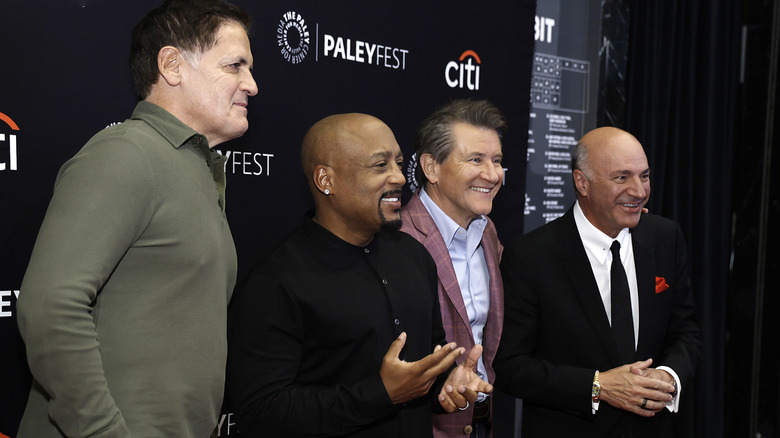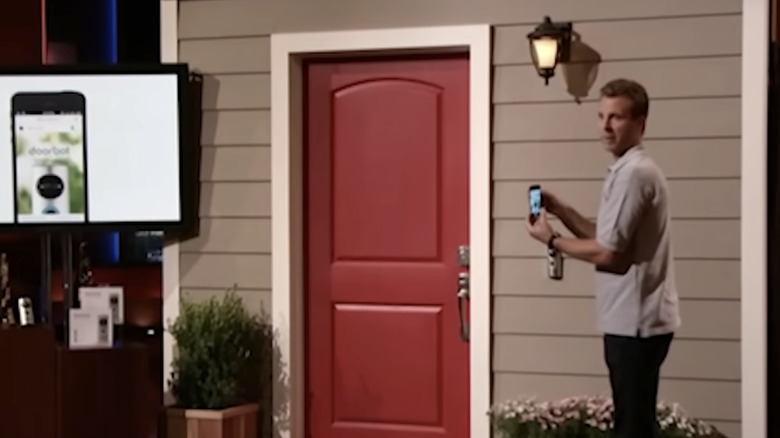Shark Tank's DoorBot: Whatever Happened To The Brand After The Show?
It's been said that during its 15 year history, about 60% of the companies appearing on ABC's hit show "Shark Tank" make a deal for funding from one or more of the venture capitalist "sharks." Though, it should also be noted that about half of those deals fall apart during the due-diligence vetting process that happens after the show is over. Some of the most profitable "Shark Tank" deals of all time include household names like Scrub Daddy and Bombas socks.
Still, some of the companies which failed to win an investment on Shark Tank have also achieved great financial success. That list of companies that persevered in spite of "Shark Tank" pessimism includes Xero Shoes, Bouqs flower delivery (a deal that Mark Cuban regrets not making), and the subject of this article: DoorBot. Some consumers might not immediately recognize the name DoorBot. That's because in 2014, company founder Jamie Siminoff changed the brand name to the catchier-sounding Ring. Obviously, Ring is still around in 2024, but exactly how successful was Siminoff and his brainchild?
A royalty demand sunk the deal
When DoorBot appeared on "Shark Tank" in 2013, Jamie Siminoff asked for a $700,000 investment in exchange for a 10% ownership stake in DoorBot. During Siminoff's sales pitch, the entrepreneur promoted the smart doorbell with an audio and video link to smartphones as "caller ID for your front door." It was also pointed out that the humble doorbell hadn't been updated significantly since its introduction back in 1880.
The only offer to invest came from Kevin "Mr. Wonderful" O'Leary. However, the funds came with one of O'Leary's trademark royalty deals, which would have siphoned off 10% (later dropping to 7%) of all revenue from the sale of DoorBot products. Siminoff rejected Mr. Wonderful's deal on the grounds that the royalty would financially constrain the fledgling company right at the exact time that it needed to reinvest the funds for growth.
Still, even without securing a deal from the sharks, benefits from the television appearance were plenty. Regular viewers of "Shark Tank" will know about the phenomenon know as the "Shark Tank Effect," whereby product sales typically skyrocket after appearing on the show. In DoorBot's case, the Shark Tank Effect resulted in $5 million in additional sales immediately following the show. That momentum led to investments by high-profiles individuals and companies both, including Goldman Sachs, Shaquille O'Neal, and Richard Branson.
Mr. Wonderful isn't perfect after all
In 2018, Ring was purchased by retail giant Amazon — where Americans spend an average of $91.75 per month — in a deal reportedly worth more than $1 billion. More specifically, the funds to acquire Ring came from Amazon's Alexa Fund. That makes perfect sense since Ring seems ideally suited for the Alexa ecosystem. Through economies of scale, Amazon was able to reduce the retail price of Ring from $199 during the "Shark Tank" era down to $99.99 per unit.
Although Jamie Siminoff stayed onboard as Ring's CEO for several years, he tendered the position to Elizabeth Hamren, former COO of Discord, in 2023. Nowadays, Siminoff is still associated with his creation, with the official title of "chief inventor." As well, he's presently involved with other businesses like the troubled smart lock company Latch — soon to be rebranded as Door.
During DoorBot's "Shark Tank" appearance, billionaire Mark Cuban commented to the effect that he couldn't see a path to growing the company to a $80 million to $90 million valuation. As it turns out, DoorBot sold for more than 10 times that amount just five years later. As for Kevin O'Leary, his $700,000 investment would have been worth somewhere north of $100 million. He's undoubtedly kicking himself over that stubborn royalty now.

